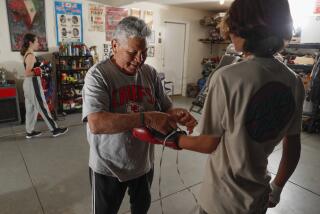Unhealed Wounds : Filipino Soldiers From W W II Are Still Fighting to Win Full Veterans Benefits
- Share via
Peping Baclig will never forget the Bataan Death March. It remains a vision as clear and cruel as the Philippine sun he and 67,000 other defeated American and Filipino troops plodded beneath in April of 1942, during the early days of World War II.
“Those who couldn’t make it, they were just slaughtered,” said Baclig, a gentle, chubby-faced man of 73. “Those who attempted to get water were killed.”
Baclig was a 20-year-old infantryman when Allied forces, almost 90% Filipino, surrendered at the southern tip of the Bataan Peninsula, where they made their last stand against invading Japanese troops. Their captors bullied them into a forced march along the mountainous peninsula to a prisoner of war camp 90 miles away.
In the three days of the Bataan Death March, 7,000 to 10,000 prisoners died.
About 600 were Americans. There was never an accurate count taken of the Filipinos.
Filipino veterans are still struggling to be counted, 50 years after the end of the war. In 1946, Congress reneged on President Franklin D. Roosevelt’s wartime promise of U.S. citizenship and full veterans benefits to the more than 100,000 Filipino soldiers who fought with U.S. troops, declaring their service had not been “active.”
More than 80% of the U.S. troops who defended the Philippines against the Japanese between December, 1941, and the U.S. surrender in May, 1942, were natives of the Philippines, then an American colony.
But the postwar congressional act, prompted by concerns about cost and interference with the affairs of the fledgling Philippines republic, declared that the Filipinos’ service had not been “active” and denied them full benefits accorded to other U.S. combat veterans.
“We fought for the American flag,” said Baclig, now an activist on behalf of Filipino veterans. “If our service was not active service, then what kind of service was it?”
Congress finally granted surviving veterans citizenship rights in 1990, paving the way for the arrival of more than 20,000 elderly Filipino men to the United States. Half of them settled in the Los Angeles region, pursuing an often elusive dream of a better life for themselves and their families.
Recently introduced federal legislation sponsored by California, New York and Hawaii lawmakers could grant the veterans benefits that are available to other U.S. war veterans, such as disability not connected to military service, widows pensions and medical and burial benefits.
But the legislation is expected to cost about $1 billion annually, a price tag thatmay make passage difficult, congressional observers say.
In the meantime, unscrupulous “recruiters” and travel agents in the Philippines turn naive, elderly veterans into profitable human cargo, luring them with false tales of pensions and benefits they will receive once they arrive.
The men are often overcharged for air fare, and sometimes charged hundreds of dollars for “services” they never see. Some travel on credit from recruiters; others sell property or borrow money from friends to make the trip.
When they arrive, they discover that the only benefits they are entitled to are those allotted to all senior American citizens: Social Security and Medicare.
Those who have no relatives to turn to often find themselves sharing decrepit apartments with several others, while some with less luck wind up at homeless shelters. Confused and disillusioned, they wonder what became of the benefits they were so certain of.
“They said we were going to have benefits when we arrived,” said Federico Juntalos, 75, a former bus driver who came five months ago to east Hollywood on credit from a Los Angeles-based attorney. “They said it was benefits for veterans, but we did not know it was SSI. They did not explain.”
Juntalos, who lives in a dingy two-bedroom apartment with three other veterans and two of their wives, is determined not to let the disappointment he has experienced so far bring him down. He plans to stay in the country and save enough money to bring his wife and three adult children here.
Disappointment has sapped some veterans’ interest in maintaining their access to U.S. citizenship. The initial two-year period allowing them to apply after 1990 was extended through last February, but there has not been any pressure from veterans groups to extend it again.
Domingo Baliwas, 68, arrived in Los Angeles in September with high hopes of saving money to bring his family. Now he is saving for a plane ticket home.
“I cannot adjust,” said Baliwas, who shares a tiny studio apartment with four other veterans. “Life is very hard here. My family is far away, and I am very lonely.”
More to Read
Sign up for Essential California
The most important California stories and recommendations in your inbox every morning.
You may occasionally receive promotional content from the Los Angeles Times.










